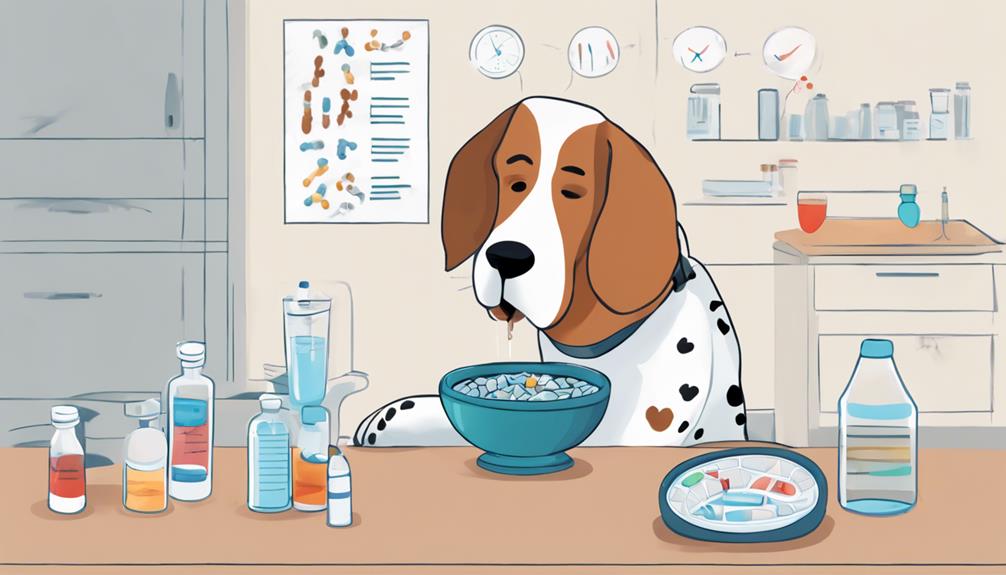9 Effective Tips for Treating Dog Kidney Disease
To effectively manage your dog's kidney disease, start by prioritizing early detection through regular screenings and check-ups. Modify their diet by reducing phosphorus and protein, and opt for renal-specific foods. Ensure proper hydration with fresh water and monitor intake. Utilize prescribed medications, supplements, and regular monitoring to track progress. Focus on symptom management, collaborate closely with your vet, and create a comfortable environment at home. By implementing these nine tips, you can greatly improve your furry friend's quality of life and well-being. Enhance your understanding of dog kidney disease and discover more ways to support your beloved pet's health.
Understanding Dog Kidney Disease
Understanding Dog Kidney Disease involves recognizing the common symptoms and risk factors associated with this condition in canines. Kidney disease in dogs can manifest through various symptoms, such as increased thirst and urination, decreased appetite, weight loss, lethargy, vomiting, and changes in urinary habits. Additionally, you may notice your dog having bad breath, mouth ulcers, or experiencing weakness. These symptoms can vary in severity depending on the stage of the disease.
When it comes to treatment options for Dog Kidney Disease, early detection is crucial for a successful outcome. Your veterinarian may recommend a combination of treatments to manage the condition and improve your dog's quality of life. Treatment approaches often include dietary changes, medication to control blood pressure, supplements to support kidney function, and in some cases, fluid therapy. It's essential to work closely with your vet to develop a tailored treatment plan for your furry companion based on their specific needs and stage of the disease. Regular monitoring and follow-up appointments will also be necessary to track your dog's progress and make any necessary adjustments to the treatment plan. Remember, with proper care and management, dogs with kidney disease can still lead happy and comfortable lives.
Early Detection Is Key
Detecting kidney disease in its early stages is crucial for effectively managing your dog's health and well-being. Regular screenings are essential to catch any signs of kidney disease early on. As a responsible pet owner, you should prioritize routine check-ups with your veterinarian to monitor your dog's kidney function. These screenings can help identify potential issues before they progress to a more serious stage.
Preventative measures play a significant role in maintaining your dog's kidney health. Providing access to fresh water at all times is vital for proper hydration, which supports kidney function. Additionally, feeding your dog a balanced diet that's suitable for their age, breed, and health status can help prevent kidney disease. Avoiding foods that are high in phosphorus and salt is recommended to reduce the strain on your dog's kidneys.
If your dog is at a higher risk of developing kidney disease due to age, breed, or other factors, more frequent screenings may be necessary. Be proactive in discussing these risks with your veterinarian to establish an appropriate screening schedule. By staying vigilant and taking preventative measures, you can increase the chances of detecting kidney disease in its early stages, allowing for timely intervention and a better prognosis for your beloved pet.
Diet Modifications for Kidneys
To support your dog's kidney health, consider making dietary adjustments that can help alleviate strain on their kidneys and promote overall well-being. When dealing with kidney disease in dogs, diet adjustments play a crucial role in managing the condition and improving your furry friend's quality of life. One key aspect to focus on is maintaining a proper balance of nutrients in their meals.
Diet adjustments for dogs with kidney disease typically involve reducing the levels of phosphorus and protein in their food. Excessive phosphorus can put additional strain on the kidneys, so opting for a low-phosphorus diet is beneficial. Additionally, limiting the amount of protein can help lessen the workload on the kidneys, as protein metabolism produces waste products that the kidneys must filter out.
When selecting commercial dog food or preparing homemade meals, ensure that the diet isn't only low in phosphorus and moderate in protein but also meets your dog's other nutritional needs. Look for specially formulated renal diets that are designed to support kidney function while providing essential vitamins and minerals. Consulting with a veterinarian or a canine nutritionist can help you create a well-balanced diet plan tailored to your dog's specific needs.
Hydration Importance for Dogs
Ensuring your dog stays well-hydrated is crucial for supporting their kidney function and overall health. Adequate hydration is of utmost importance in preventing kidney disease and maintaining optimal health in dogs. Water plays a vital role in flushing out toxins from the kidneys, regulating body temperature, aiding digestion, and ensuring proper organ function.
Proper hydration helps prevent the formation of kidney stones and urinary tract infections, which are common issues in dogs with kidney disease. Dehydration can lead to concentrated urine, making it harder for the kidneys to filter waste products effectively. This can put a strain on the kidneys and worsen any existing kidney issues.
To promote hydration in your dog, always provide access to fresh, clean water. Monitor your dog's water intake to ensure they're drinking enough, especially during hot weather or after physical activity. Adding water to your dog's food or feeding wet food can also help increase their fluid intake.
Signs of dehydration in dogs include dry gums, sunken eyes, lethargy, and loss of appetite. If you suspect your dog is dehydrated, consult your veterinarian immediately. Remember, proper hydration is key to maintaining your dog's kidney health and overall well-being.
Medications and Supplements
Maintaining your dog's kidney health may involve the use of specific medications and supplements recommended by your veterinarian. When it comes to managing your dog's kidney disease, there are various treatment options available to help support their kidney function and overall well-being.
- Prescription Medications: Your veterinarian may prescribe medications to help manage symptoms and slow down the progression of kidney disease. These medications can help regulate blood pressure, control protein loss, and reduce the workload on the kidneys.
- Supplements: Certain supplements can be beneficial in supporting your dog's kidney health. Omega-3 fatty acids, for example, have anti-inflammatory properties that may help reduce kidney inflammation. Additionally, phosphorus binders can be used to reduce phosphorus levels in the blood, which is crucial for dogs with kidney disease.
- Natural Remedies: Some natural remedies may complement traditional treatments for kidney disease. Herbal supplements like milk thistle or dandelion root may help support kidney function. However, it's essential to consult with your vet before adding any natural remedies to your dog's treatment plan to ensure they're safe and effective.
Incorporating a combination of prescription medications, supplements, and natural remedies can provide comprehensive support for your dog's kidney health. Always follow your veterinarian's recommendations and attend regular check-ups to monitor your dog's progress effectively.
Monitoring Progress Regularly
Regular monitoring of your dog's kidney health is essential to track progress and make any necessary adjustments to their treatment plan. By consistently tracking the data related to your dog's kidney disease, you can analyze trends, identify potential issues, and measure the effectiveness of the current treatment regimen.
To monitor progress effectively, it's crucial to keep detailed records of your dog's symptoms, behavior, and any changes in their condition. This information will serve as a valuable reference point for evaluating the success of the treatment and determining if any adjustments are needed.
In addition to symptom tracking, regular check-ups with your veterinarian are vital for assessing your dog's kidney function. Through blood tests, urine analysis, and other diagnostic tools, your vet can provide valuable insights into the progression of the disease and the overall health of your dog's kidneys.
Based on the data collected and analyzed, your vet may recommend adjustments to your dog's treatment plan. Success indicators such as improved kidney function, stabilized symptoms, and overall well-being can guide these adjustments. Collaborating closely with your veterinarian and following their recommendations will help ensure the best possible outcome for your dog's kidney disease treatment.
Managing Symptoms Effectively

To effectively manage symptoms of kidney disease in your dog, it's important to closely observe any changes in their behavior and promptly address any discomfort they may be experiencing. Symptoms can vary from increased thirst and urination to weight loss and decreased appetite. Here are some key tips for managing these symptoms and improving your dog's quality of life:
- Dietary Adjustments: Work with your vet to create a kidney-friendly diet for your dog. This may involve reducing protein intake and monitoring phosphorus levels in their food. A specialized diet can help ease symptoms and slow down the progression of the disease.
- Hydration: Ensure your dog has access to fresh water at all times. Proper hydration is crucial for kidney function. You can also discuss with your vet the possibility of adding wet food to their diet to increase their fluid intake.
- Monitoring and Exercise: Keep a close eye on your dog's weight and overall condition. Regular, gentle exercise can help maintain muscle mass and overall health. However, avoid strenuous activities that could put additional stress on their kidneys.
Making these lifestyle changes can significantly impact your dog's well-being and help alleviate symptoms associated with kidney disease. By being proactive and attentive to your dog's needs, you can provide them with the support and care they need to live a comfortable life despite their condition.
Consulting With a Vet
When seeking guidance on managing your dog's kidney disease, initiating a consultation with a veterinarian is paramount for tailored treatment recommendations. Your vet will assess your dog's condition, consider various factors like age and overall health, and provide personalized recommendations for managing kidney disease. Vet recommendations may include dietary changes, medication, and monitoring protocols to help alleviate symptoms and slow down the progression of the disease.
During your consultation, your vet will discuss different treatment options available for your dog's kidney disease. These treatment options may include medications to manage blood pressure, improve kidney function, and address symptoms like nausea and anemia. Your vet will work with you to create a treatment plan that suits your dog's specific needs and helps maintain their quality of life.
In addition to medical interventions, your vet may also recommend supportive care and holistic approaches to complement the treatment plan. This can involve strategies such as providing a low-protein diet, ensuring adequate hydration, and managing stress levels to support your dog's overall well-being.
Creating a Comfortable Environment

For your dog with kidney disease, ensuring a comfortable environment is essential in promoting their well-being and aiding in their treatment journey. Here are some tips to help you create a soothing space for your furry friend:
- Maintain a Consistent Routine: Dogs with kidney disease can benefit from a predictable schedule. Establish set times for feeding, medication, walks, and rest to reduce stress and create a sense of security for your pet.
- Provide a Quiet and Calm Space: Designate a peaceful area in your home where your dog can retreat to relax. Keep this spot away from high-traffic areas and loud noises to minimize anxiety and promote restful sleep.
- Utilize Home Remedies: Incorporating natural remedies such as special diets, herbal supplements, or probiotics can complement conventional treatments and support your dog's kidney health. Consult with your vet before introducing any new home remedies to ensure they're safe and effective.
Creating a comfortable environment for your dog with kidney disease is crucial for their overall well-being. By implementing these strategies, you can help reduce stress, enhance their quality of life, and support their treatment plan effectively.
Frequently Asked Questions
Can Dog Kidney Disease Be Completely Cured?
Dog kidney disease can't be completely cured, but the prognosis can be managed effectively with treatment.
The progression of the disease can be slowed down with proper care and intervention.
Regular visits to the veterinarian, a balanced diet, appropriate medications, and monitoring of your dog's condition can help improve their quality of life and potentially extend their lifespan.
It's important to work closely with your vet to create a tailored treatment plan for your furry friend.
Is It Safe to Give Human Medications to Dogs With Kidney Disease?
It's not safe to give human medications to dogs with kidney disease without consulting a vet first. Human drugs can be harmful to your pet's renal function if not used properly. Always follow dosage guidelines specifically tailored for dogs to avoid complications.
Consult a veterinarian for appropriate medications that are safe and effective for treating your dog's kidney disease. Your vet will provide the best guidance on how to manage your pet's condition safely.
What Are the Long-Term Effects of Untreated Kidney Disease in Dogs?
If left untreated, kidney disease in dogs can lead to severe complications and a poor prognosis. Without proper management, the condition can progress, affecting their quality of life.
Long-term effects may include increased thirst, weight loss, lethargy, and eventually kidney failure.
Early detection and treatment are crucial to improve the prognosis and maintain a better quality of life for your furry friend.
Are There Any Alternative Therapies That Can Help Manage Kidney Disease in Dogs?
When it comes to managing kidney disease in dogs, you may consider exploring alternative therapies. Herbal remedies, acupuncture, dietary supplements, and holistic treatments can be beneficial.
These options can complement traditional veterinary care and help support your dog's overall well-being. Be sure to consult with your veterinarian before starting any new therapies to ensure they're safe and appropriate for your furry friend's specific situation.
How Can I Prevent Kidney Disease in My Dog in the Future?
To prevent kidney disease in your dog in the future, focus on preventive measures like regular vet check-ups and providing a balanced diet.
Dietary adjustments play a crucial role in maintaining kidney health. Ensure your dog stays hydrated, limit phosphorus intake, and offer a high-quality, low-protein diet.
Conclusion
In conclusion, treating dog kidney disease requires a comprehensive approach that includes early detection, diet modifications, hydration, medications, and regular monitoring.
By consulting with a vet and creating a comfortable environment for your furry friend, you can effectively manage symptoms and improve their quality of life.
Remember to stay proactive and attentive to your dog's needs to ensure they receive the best care possible for their kidney health.
